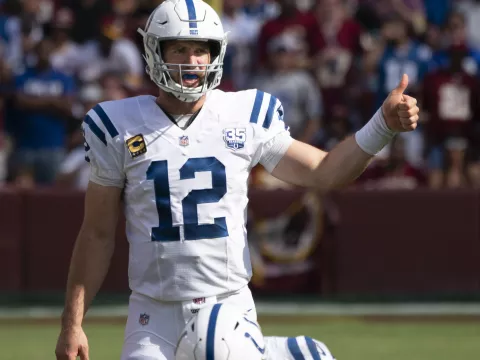- AdventHealth

Just days ago, Indianapolis Colts quarterback Andrew Luck announced his retirement from the NFL. His reason for departing was reportedly a cycle of constant injuries and rehabilitation that have held him back from living his best life and loving the game of football, too.
On the subject of his retirement, Luck was quoted saying, "I haven't been able to live the life I want to live. It's taken the joy out of this game ... the only way forward for me is to remove myself from football.”
For a professional athlete, a career-ending decision such as this one comes with both a physical and emotional toll.
Luck has said, "It's been four years of this pain, rehab cycle. It's a myriad of issues -- calf strain, posterior ankle impingement, high ankle sprain. Part of my journey going forward will be figuring out how to feel better.''
The truth is that whether you’re a pro athlete, weekend player or high school all-star, injuries can be a major setback to your whole health.
Injuries can take the spring from your step, affect your mental focus and even dampen your spirit for the game itself.
So, take charge, now. Read up on some of the most common sports injuries (and how to prevent them) to keep your body, mind and love for the game strong.
Acute Sports Injuries
Acute injuries often happen when you change direction suddenly while running, collide with another player or fall during play. This type of injury happens quickly and can be severe.
Common acute injuries include:
- Broken bones
- Concussion
- Dislocated shoulder
- Fractures
- Knee injuries, such as ACL and meniscus tears
- Muscle sprains and strains
- Rotator cuff tears
You may also be putting yourself at risk for acute sports injury if you’re pushing your body beyond your skill and fitness levels, skip warm-up routines, use improper training methods or aren’t using the safest equipment.
Symptoms of acute injuries include:
- Extreme tenderness on the injured area
- Headache or dizziness, nausea and vomiting (concussion)
- Injured arm or leg won’t support weight
- No range of motion in a joint
- Odd angle in a broken bone
- Sudden severe pain
- Swelling
Chronic Sports Injuries
Chronic injuries develop from long-term repetitive motion in sports like long-distance running, cycling and swimming.
Sometimes called overuse injuries, they result from wear and tear over time, and can be made worse through improper technique.
Chronic sports injuries include:
- Achilles tendon injuries (in runners)
- Runner's knee
- Stress fractures
- Tennis elbow
Chronic injuries have symptoms in the affected area such as:
- Dull ache when resting
- Pain during activity
- Swelling or fluid build-up
Treatment for Acute and Chronic Sports Injuries
If you do happen to get injured, it’s important to get the right medical evaluation and treatment.
For immediate relief from an acute or chronic injury, and to reduce swelling, use the RICE method:
- Rest to prevent further injury
- Ice for 10-20 minutes every 3 hours
- Compress the injured area to reduce swelling
- Elevate an injured arm or leg above the heart to reduce swelling
With your physician’s approval, you can also take nonsteroidal anti-inflammatory medications such as aspirin, ibuprofen or naproxen to help with the pain.
Although acute injuries are sudden, they often take weeks to heal and may require physical therapy or surgery to help you get back in shape.
If not treated, acute injuries can become chronic conditions. Concussions (especially) require immediate evaluation by a doctor after the injury and before you can return to play.
Chronic sports injuries develop over time, and it takes more time to manage or heal them. Like acute injuries, you may need physical therapy or even surgery, depending on the type and severity of your injury.
The Emotional Impact of a Sports Injury
Just like Luck, both acute and chronic sports injuries can have life-changing consequences.
In addition to not being able to participate in a game that brings you joy, you may also be faced with other physical and emotional hardships to overcome.
You may be in chronic physical pain, unable to perform your job, facing restrictions on driving, relying on loved ones and friends for help, and having to sit out on other activities that you love, just to name a few.
A sports injury can change your whole life, and sometimes, healing from a sports injury must go beyond the physical aspects to include emotional and spiritual recovery, too. This is the kind of whole-person care that our sports medicine experts deliver.
Tips to Play Hard and Protect Your Whole Health
One of the best ways to avoid acute or chronic injuries is to stay in shape, improve your technique with the help of properly trained professionals and always warm up.
It’s also good advice to have a trusted sports medicine professional ready to help you if you do experience an injury.
If your injury is affecting your mental or spiritual well-being, it’s important to recognize that and get help. Be honest with your doctor about any symptoms of depression, anxiety or other mental and behavioral disorders that might be related to your injury and the changes it’s brought to your life.
If you’re focused on injury prevention, need help healing an acute or chronic sports injury, or are looking for whole-health orthopedic care, our experts are here to help.
Find a physical therapy and sports rehab specialist near you.



